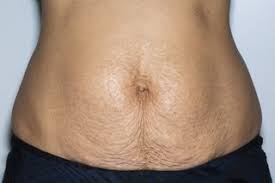
Why women develop stretch marks during pregnancy
Medical experts have given reasons why some women develop stretch marks during pregnancy, affirming that it has more to do with a woman’s genetic composition.
The experts said the skin around the abdomen stretches as a result of the baby’s growth and cautioned pregnant women against trying to remove stretch marks at all costs with cosmetic products as it is among conditions that seem impossible to reverse.
The physicians insisted that there is no treatment proven to prevent stretch marks as the lines also known as striae, which could be red, pink or purple will not disappear, but will fade away over time after delivery.
According to the American College of Obstetricians and Gynaecologists, there are no proven remedies that keep stretch marks from appearing or that make them go away during pregnancy.
“As your belly grows during pregnancy, your skin may become marked with reddish lines called stretch marks. By the third trimester, many pregnant women commonly have stretch marks on the abdomen, buttocks, breasts, or thighs.
“Using a heavy moisturiser may help keep your skin soft, but it will not help get rid of stretch marks. Most stretch marks fade after the baby is born, but they may never disappear completely”, says ACOG.
A Public Health Physician at the Department of Community Medicine, Ahmadu Bello University Teaching Hospital, Zaria, Kaduna State, Dr. Aliyu Sokomba, who spoke during an interview with PUNCH Healthwise, identified genetic makeup as one of the reasons why some women may have stretch marks during pregnancy.
“Usually when a woman is pregnant, the skin stretches to accommodate the pregnancy.
“In some women, the skin stretches beyond its elasticity and leaves a mark. That mark is called a stretch mark. What that means is that in the genetic makeup of that person, the skin does not stretch in such a way that it will return to where it was. It is in that person’s genetic build that she will have a mark when the skin stretches.
“So, why would that person now use cream to cover it up? Obviously, what is engrained in your genetic makeup would mean that that is what your body makes up. So, pregnant women with stretch marks who are applying creams on them will not change what their body composition is. The stretch marks will remain.”
The physician, however, pointed out that not all pregnant women would have stretch marks.
“In those that do not have stretch marks in their genetic makeup, their skin can stretch but it will not get to the elasticity limit that will make them form a mark.
“For women with stretch marks, it is in their genetic makeup, there is little or nothing the cream can do for them.
“Again, in pregnancy, women’s abdomen stretches. But that is not the only reason.
“Weight gain also adds to the stretch. Usually, when women are pregnant, they need to be wary of unnecessary weight gain and ensure that the skin does not stretch more than what the foetus is causing.
“Pregnant women should eat healthy and drink a lot of water to maintain hydration. They should apply olive oil on their skin to moisturise it.
“These measures will go a long way in reducing the rate at which stretch marks are formed in those that are genetically predisposed to forming stretch marks.
“Also, they should do a lot of exercise and learn to love themselves because stretch marks are not as ugly as they portray them to be”, the physician noted.
Commenting on the adverse effects of anti-stretch mark creams, Sokomba said they could cause skin cancer.
“Whenever there is a genetic makeup alteration, then, there is a chance for the cells of that part of the body to become cancerous.
“So, when creams that have different chemical compositions are applied and they are capable of causing alteration of the genetic composition of the individual, then it predisposes the person to skin cancer” he cautioned.
Speaking also, a Consultant Physician and Dermatologist at the Lagos State University Teaching Hospital, Ikeja, Dr. Folakemi Cole-Adeife, said stretch marks generally is not a skin condition that can be completely reversed or cleared, and advised pregnant women to avoid using any cream to remove them.
She noted that in pregnancy, the skin around the abdomen stretches as a result of the growth of the baby, adding that Vitamin E-containing oil could help minimise the development of stretch marks.
In a 2015 University of Michigan Health System study published in ScienceDaily, the researchers said most of the existing anti-stretch mark creams aren’t based on solid scientific research.
“Don’t believe the hype when you see those creams and ointments promising to prevent or reduce pregnancy stretch marks. Dermatologists are still learning about what causes stretch marks in the first place”, the researchers said.





